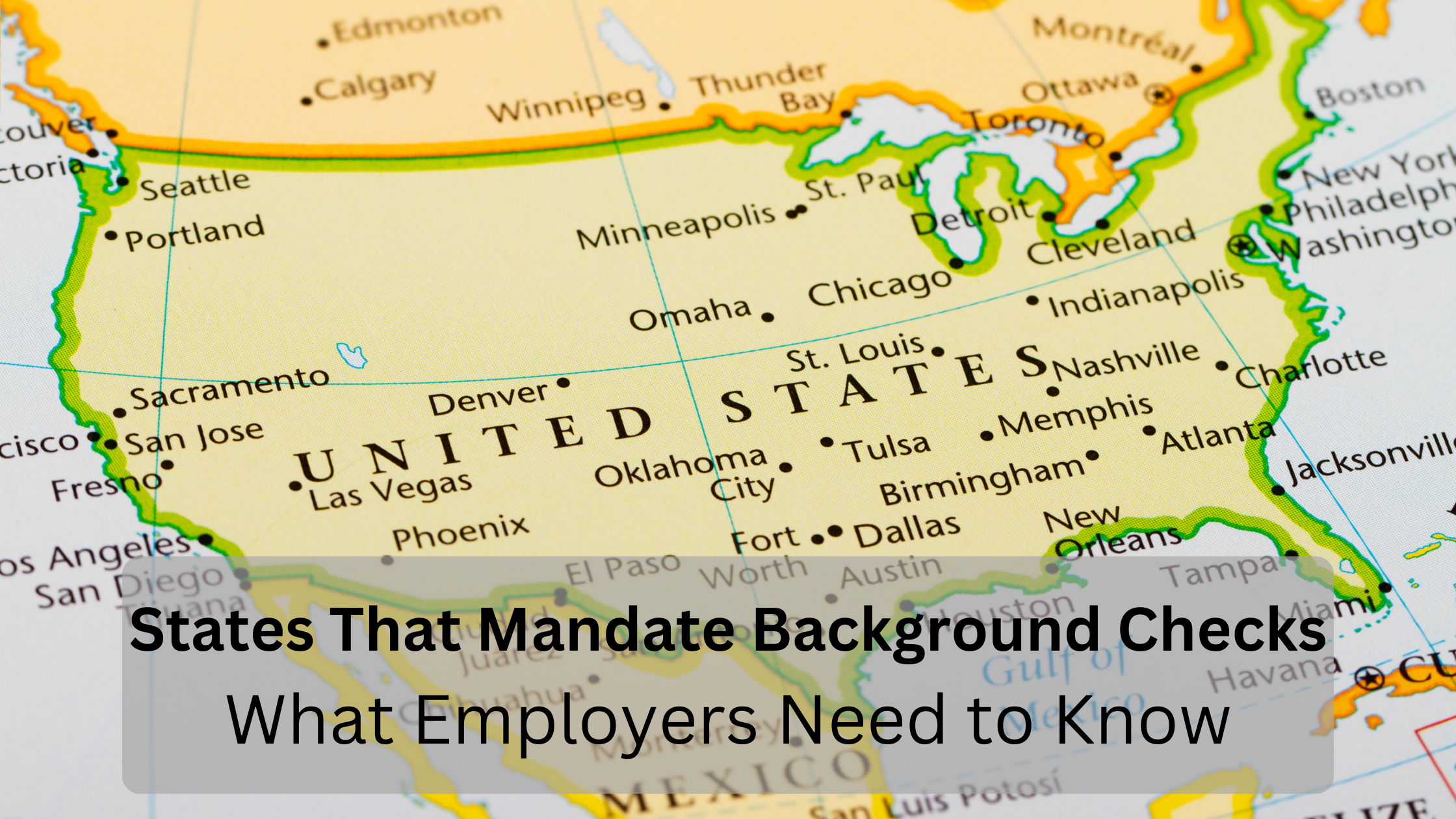States That Require Background Checks: Key Information Every Employer Should Know
Background checks are a critical component of the hiring process for employers, ensuring they make informed decisions about potential employees. However, not all states have the same requirements when it comes to conducting background checks. Understanding the varying laws and regulations across states is vital for employers to remain compliant while protecting their businesses and maintaining a safe work environment. This article delves into the importance of background checks, the types commonly required, and a closer look at the states with specific background check mandates.
What Are Background Checks and Why Are They Important?
Background checks serve as an essential tool for employers to verify the qualifications, criminal history, and other critical details about a potential hire. These checks are used to assess whether an applicant is suitable for a role, ensuring they align with the company’s values and standards. While the need for background checks is generally acknowledged across industries, the specific requirements vary by state and even by the type of role being filled.
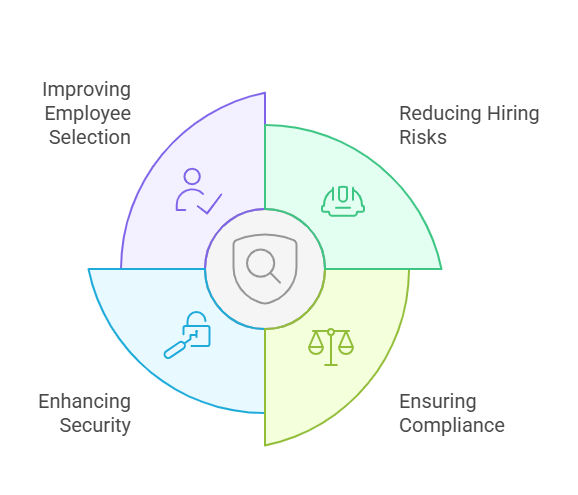
Employers rely on background checks for multiple reasons, including:
- Reducing hiring risks: Verifying an applicant’s background ensures that they have a history free from issues that could jeopardize workplace safety or integrity.
- Ensuring compliance with state regulations: Different states have different laws governing background checks, so knowing these specifics is crucial for ensuring compliance.
- Enhancing security: Employers can minimize the risk of hiring someone with a criminal record or false credentials that could put their organization at risk.
- Improving employee selection: Accurate background checks help companies identify the most qualified candidates, leading to better hiring decisions.
Types of Background Checks Commonly Performed
Several types of background checks are typically performed during the hiring process, depending on the nature of the role and the state requirements. The most common checks include:
- Criminal History Check: Verifying whether the applicant has a criminal record. Criminal background checks are especially important in industries where safety is a primary concern.
- Employment Verification: Confirming past employment, including job titles, responsibilities, and dates of employment, helps validate the accuracy of an applicant’s work history.
- Education Verification: Ensuring that the applicant possesses the academic qualifications they claim, such as a degree or certification.
- Credit History Check: Often required for financial or management positions, this check assesses an applicant’s financial responsibility and history.
- Drug Testing: Some industries and states require drug testing as part of the background check process to ensure workplace safety.
- Social Media Screening: Although not a standard requirement, some employers may review an applicant’s social media profiles to gauge their character and behavior.
States That Require Background Checks
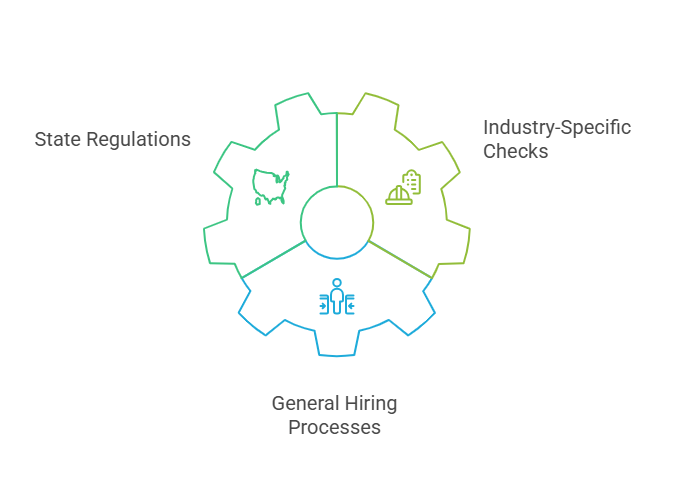
While background checks are common practice nationwide, each state has its own set of rules and regulations that may dictate what types of checks are required and under what circumstances. Some states mandate that background checks are necessary for certain industries, while others may require them across all hiring processes.
States with Universal Background Check Requirements
A few states require background checks for all employees, regardless of the industry. These states usually have stringent regulations that apply to both criminal history checks and employment verification:
- California: In California, background checks are required for most employers, but they must comply with state-specific regulations, such as those outlined in the Fair Chance Act, which limits the use of criminal history in hiring decisions.
- Texas: Employers in Texas are generally required to conduct criminal history checks for employees, especially in industries such as healthcare, education, and law enforcement.
- New York: New York mandates background checks for most job types and includes specific laws related to the usage of criminal history during the hiring process.
States with Industry-Specific Background Check Requirements
Some states only require background checks for specific industries, such as healthcare, finance, or education. For example:
- Florida: Employers in Florida are required to perform background checks on employees in healthcare settings, such as hospitals and nursing homes, due to the sensitive nature of the work.
- Michigan: In Michigan, background checks are mandated for certain positions, including those in law enforcement and childcare, where public safety is a concern.
- Illinois: Employers in Illinois must conduct background checks for individuals seeking employment in education, particularly in roles involving direct interaction with children.
States with Specific Laws Regarding Criminal Background Checks
Certain states impose unique restrictions on the use of criminal background checks. These laws are often designed to protect candidates with criminal records from unfair discrimination:
- Ban the Box States: Many states, including Hawaii, Minnesota, and California, have “Ban the Box” laws. These laws prevent employers from asking about criminal history on job applications, requiring employers to delay inquiries about criminal backgrounds until later in the hiring process.
- Massachusetts: In Massachusetts, the state law prohibits employers from considering criminal records that have been sealed or expunged.
Table: States and Their Requirements for Background Checks
Here is a table summarizing the background check requirements in various states and industries:
| State | Required Background Check Type | Industry-Specific Notes |
|---|---|---|
| California | Criminal history, employment verification | Fair Chance Act limits criminal history use in hiring |
| Texas | Criminal history, education verification | Healthcare, law enforcement roles must have background checks |
| New York | Criminal history, credit checks | All employers, with limits on criminal history use |
| Florida | Criminal history, employment verification | Required in healthcare settings |
| Michigan | Criminal history, drug testing | Specific to law enforcement and childcare positions |
| Illinois | Criminal history, drug testing | Education roles, particularly in child-facing positions |
How RapidHireSolutions Can Help Employers
Navigating the complex landscape of background checks can be challenging, especially with varying requirements across states. This is where RapidHireSolutions comes in. As a trusted provider of fast, accurate, and compliant background check services, RapidHireSolutions ensures that employers are fully compliant with state-specific regulations.
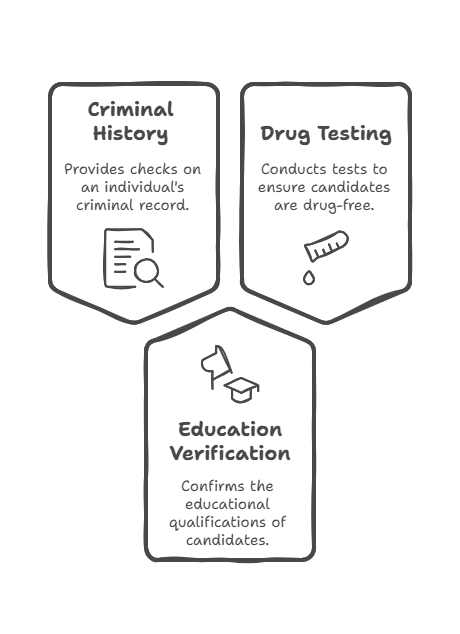
RapidHireSolutions simplifies the background check process by offering a wide range of services that help employers meet legal requirements in different states. Whether you need criminal history checks, education verifications, or drug testing, RapidHireSolutions can quickly deliver the necessary results, saving you time and helping you avoid the risks associated with non-compliance.
By partnering with RapidHireSolutions, employers can streamline their hiring processes and ensure they are hiring the most qualified candidates while adhering to state regulations.
Comparing RapidHireSolutions vs. Competitors in Providing Background Checks
When it comes to background check services, employers have several options to choose from. However, not all background check providers are created equal. To help businesses make an informed decision, let’s compare RapidHireSolutions with a competitor based on key factors that matter the most to employers: compliance with state laws, speed of background checks, data security, ease of use, and range of services.
Pros and Cons Table: RapidHireSolutions vs. Competitor
| Factor | RapidHireSolutions | Competitor |
|---|---|---|
| Compliance with State Laws | ✅ Ensures full compliance with state-specific requirements | ❌ May struggle with state-specific compliance |
| Speed of Background Checks | ✅ Fast processing (24 – hours) | ❌ Slower processing (15-20+ days) |
| Data Security Standards | ✅ High-level encryption and privacy protections | ❌ Basic data security measures |
| Ease of Use | ✅ User-friendly interface, easy navigation | ❌ Complicated user experience |
| Range of Services | ✅ Comprehensive, including criminal history, employment, education, credit, and drug testing | ❌ Limited range of services |
Why Choose RapidHireSolutions?
RapidHireSolutions stands out as the premier choice for employers seeking reliable and timely background checks. The company ensures full compliance with state laws, which is crucial in the ever-changing regulatory landscape. With RapidHireSolutions, employers can be confident that the checks are not only accurate but also legally compliant for their specific state requirements.
One of the most significant advantages of RapidHireSolutions is its speed. While many competitors take weeks to process background checks, RapidHireSolutions offers a turnaround time of just 24 hours, making it an ideal choice for employers who need to make quick, informed hiring decisions. This is particularly beneficial in fast-paced industries or when dealing with a high volume of candidates.
In addition to speed, RapidHireSolutions ensures that all data is handled with the highest level of security. Employers can trust that sensitive information is protected using advanced encryption methods, something that many competitors fail to offer. RapidHireSolutions’ user-friendly interface also makes the entire background check process seamless, allowing HR teams to quickly access results without unnecessary complexity.
Processing Time Comparison Table
| Provider | Average Processing Time |
|---|---|
| RapidHireSolutions | 24-hours |
| Competitor | 15-20+ days |
Detailed Analysis: Why RapidHireSolutions Is the Best Choice
The time factor is often the most critical consideration for employers when selecting a background check provider. RapidHireSolutions not only offers quick processing times, but it also ensures that the results are comprehensive and reliable. Unlike many competitors that may take weeks to complete a check, RapidHireSolutions’ fast processing time gives employers the ability to make decisions in a fraction of the time.
Speed and compliance are essential, but they are not the only considerations. RapidHireSolutions also provides employers with comprehensive services, covering a wide range of background check needs, including criminal history, credit reports, education verification, and drug testing. This all-in-one approach eliminates the need to use multiple providers, saving time and reducing the potential for errors or inconsistencies between different services.
Pros and Cons of RapidHireSolutions vs. Competitors
Pros of RapidHireSolutions:
- Fast Processing Time: Background checks are completed within 24-48 hours, allowing for quicker hiring decisions.
- Compliance with State Regulations: RapidHireSolutions ensures full compliance with state-specific laws, avoiding legal risks.
- Comprehensive Range of Services: Includes criminal, employment, education, credit, and drug testing checks—all in one platform.
- User-Friendly Interface: Easy-to-navigate dashboard and clear reporting make it simple for employers to use.
Cons of Competitors:
- Slow Processing Times: Most competitors require 15-20+ days to process background checks, leading to delays in hiring.
- Limited Compliance: Some competitors may not fully comply with state-specific background check laws, risking legal non-compliance.
- Outdated Data: Competitors may provide outdated or incomplete data, leading to less accurate hiring decisions.
- Complex User Interface: Many competitors have clunky platforms that make it harder for employers to access and interpret results.
How RapidHireSolutions Supports Employers
Using RapidHireSolutions for background checks ensures that employers have access to timely and accurate data, whether it’s criminal history, employment verification, or credit reports. The company’s comprehensive service offering provides everything an employer needs in one place, making it easier to stay compliant with state laws and maintain a streamlined hiring process.
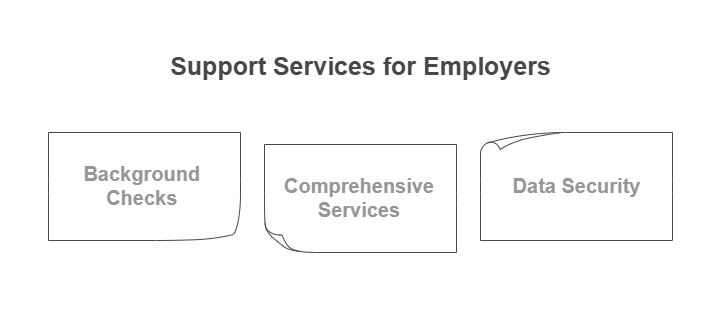
Additionally, RapidHireSolutions’ commitment to data security is a key factor in why so many employers trust them. With robust encryption and a focus on privacy, employers can confidently rely on RapidHireSolutions for handling sensitive candidate information.
In an increasingly competitive job market, employers need to make swift and informed decisions. With RapidHireSolutions, businesses can achieve this without sacrificing compliance, security, or the quality of their hiring process. By choosing RapidHireSolutions, employers are not only getting a service provider—they are gaining a reliable partner for their long-term hiring success.
Legal Considerations, FAQs, and Conclusion
In this section, we will explore the legal considerations surrounding background checks, answer common questions employers may have, and conclude with key takeaways. Understanding the legal landscape is crucial to ensuring employers remain compliant and avoid legal pitfalls when conducting background checks on potential hires.
Legal Considerations for Background Checks
When conducting background checks, it’s essential for employers to follow various legal guidelines to ensure compliance. Failure to adhere to these guidelines can lead to costly legal consequences. Here are some important laws and regulations that affect background checks:
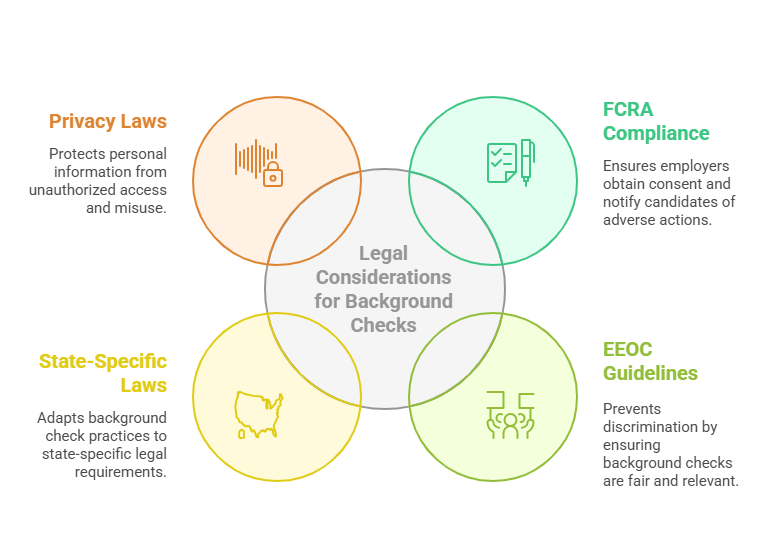
1. Fair Credit Reporting Act (FCRA)
The Fair Credit Reporting Act (FCRA) is a federal law that regulates how background checks can be conducted. The FCRA requires employers to obtain written consent from candidates before running background checks. It also mandates that employers inform candidates if adverse action is taken based on the results of the background check, such as disqualifying them from a job.
2. Equal Employment Opportunity Commission (EEOC) Guidelines
The EEOC enforces federal laws prohibiting employment discrimination. Employers must ensure that their background check processes do not disproportionately impact protected classes, such as race, color, national origin, sex, disability, or religion. The EEOC recommends that background checks be used fairly and only for positions where the check is directly relevant.
3. State-Specific Laws
State laws can vary significantly when it comes to background checks. Some states have specific requirements for what types of background checks are required for certain industries. For example, healthcare workers or those working with children may be subject to more stringent background screening. Additionally, many states have “ban the box” laws, which prohibit employers from asking about criminal history on job applications.
4. Privacy Laws
Privacy is a critical concern when handling sensitive data, including information obtained through background checks. Employers must ensure that they comply with state and federal privacy laws regarding the collection, storage, and use of personal information. For example, employers must safeguard Social Security numbers and other personal data to prevent identity theft.
Frequently Asked Questions (FAQs)
Which states require background checks for all employees?
While not all states mandate background checks for all employees, many states do require them for certain industries, such as healthcare, education, and financial services. Employers should research the specific laws in their state and industry to determine which checks are necessary.
Are background checks legally required in all hiring processes?
Background checks are not universally required in all hiring processes. However, many employers conduct them as part of their hiring policies to ensure workplace safety, verify qualifications, and prevent fraud. In some industries or for specific positions (such as those involving children or vulnerable adults), background checks may be legally mandated.
How do state laws affect background check compliance?
State laws can affect the type of background checks an employer is required to perform, as well as how background check information should be handled. Some states have stricter regulations for certain in industries, while others may prohibit the use of certain types of background check information, such as arrest records.
What happens if an employer fails to comply with state background check laws?
Failing to comply with state background check laws can result in legal consequences, including fines, penalties, and lawsuits. In some cases, employers may face lawsuits from candidates if they do not follow proper procedures for obtaining consent, disclosing results, or taking adverse action based on background check information.
Why is it important to use a reliable provider like RapidHireSolutions for background checks?
Using a reliable provider like RapidHireSolutions ensures that employers remain compliant with state and federal laws while obtaining accurate and timely background check results. RapidHireSolutions offers fast processing, secure data handling, and a comprehensive range of services, making it easier for employers to manage their background check needs with confidence.
Conclusion
In conclusion, understanding the states that require background checks and the legal implications associated with them is essential for employers to remain compliant and avoid legal challenges. Whether you’re in a state with strict regulations or a state with more lenient laws, it’s crucial to choose a background check provider that ensures your business adheres to all applicable requirements.
RapidHireSolutions stands out as a top-tier background check service provider, offering quick, accurate, and compliant background screening. With its user-friendly interface, fast processing times, and commitment to legal compliance, RapidHireSolutions is the ideal partner for employers who want to streamline their hiring process while ensuring they meet state-specific requirements.
Employers who choose RapidHireSolutions can feel confident that they are partnering with a reliable and experienced provider to help them navigate the complexities of background checks, making the hiring process safer, faster, and more efficient.

